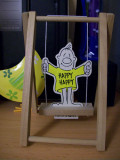Tips For Family And Friends Caring For Someone With Bipolar Disorder


Things You Can Do To Help
Do not take bipolar episodes personally. When in the storm of a bipolar episode, the bipolar person often says or does things that are hurtful or oftentimes inappropriate. When in a manic episode, they may become excited, difficult, overwhelmed, impulsive or even psychotic. When depressed, they may become sad, discouraging, irritable, and seriously despondent. These are symptoms of a mental illness. They are not your fault. You should not feel responsible for what is happening to your loved one during a bipolar episode.
Prepare yourself for some very erratic and often hostile behaviors. Sometimes the person with bipolar disorder will act in some very inappropriate ways. These can be extremely destructive and reckless. Sexually promiscuous, or over-spending behaviors are early signs of a bipolar episode. Knowing how to handle these kinds of behaviors ahead of time can benefit you greatly. Having a crisis plan in place is a good idea. Agree ahead of time what steps should be taken when an intervention becomes necessary. Put the crisis plan in writing, so it is always available to all involved.
Oftentimes the crisis plan includes hospitalization. Making contact with therapists and psychiatrists. Having this information available to you will benefit all people involved. Talking with your loved one who is bipolar on how things should be handled ahead of time saves a great deal of heartache later on.
Some other things you can do
- Spend time with the each other. People who are manic or severely depressed sometimes feel isolated and completely alone. Doing things you enjoy together will help you both feel connected and less isolated. People with bipolar disorder sometimes need to be reminded people still care about them, even during an episode.
- Avoid confrontation if at all possible. If the person with bipolar is manic they may have a tendency to argue. And have grandiose idea's.
- If the bipolar person is depressed they may want to sleep a lot. This can actually be a good thing. Don't force them to get up. Suggesting they eat or shower with your help is a start. Remember it isn't your fault.
- You can help the person by scheduling and tracking medications, making doctor, or therapy appointments, and reporting any changes in mood. Do so gently, as oftentimes a bipolar person will take this as nagging.
- Create a support system for yourself. Have friends and family you can talk to who can listen when you need to talk, vent or want to get away. Sharing your feelings with a support group or a therapist can be beneficial for you as well.
Be Prepared
Knowing what to do in a crisis is very important. Make sure you have a list of emergency contact information of doctors, therapists, and other family and friends who are able to help you if needed. Be sure to include the address and phone numbers of the hospital you will take the person to if it becomes necessary.
If the person with bipolar disorder is suicidal or showing violent outbursts, you might want to call 911 or go to the emergency room and let them diffuse the situation. Someone with bipolar can sometimes escalate, and it is best for everyone's safety if professionals are involved.








